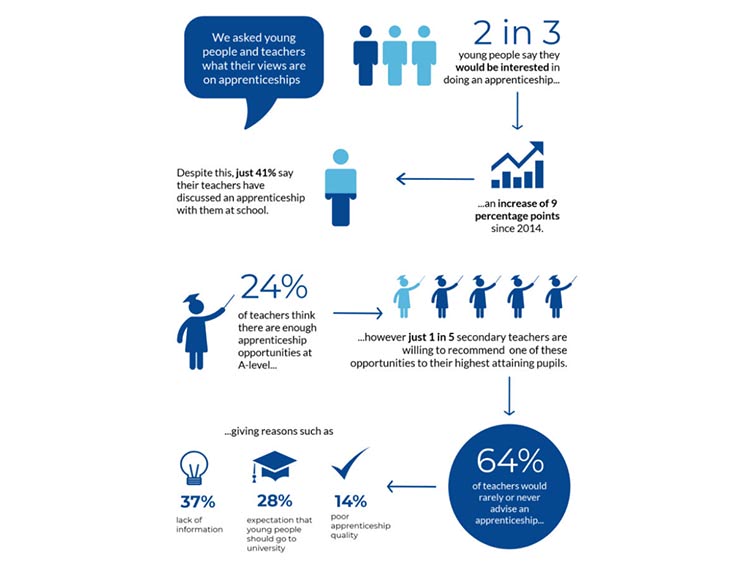Parents still more likely to advise their child to go to university than take a top apprenticeship

Parents are more likely to advise their child to go to university than take a degree-level apprenticeship, with middle-class parents more likely than poorer parents to offer this advice, according to new polling published by the Sutton Trust today (1 Mar).
1,017 parents of children aged 5 to 16 who attend school were asked how likely they’d be to advise their child to go to university or do a degree-level apprenticeship. Slightly more parents (31%) said they’d advise university over an apprenticeship (27%), while another quarter (23%) said they thought the two options were equal.
However, upper middle class parents were less likely than poorer parents to advise their child to take an apprenticeship. 42% of professional parents said they were more likely to advise their child to go to university than undertake an apprenticeship, compared to a quarter (23%) of working-class parents.
For the parents who were more likely to advise their child to take a degree rather than an apprenticeship, most (68%) felt that university offered better career prospects, while 29% felt they had a lack of knowledge about apprenticeships. One in five parents (20%) felt that the quality of some apprenticeships is poor.
The polling also highlights a lack of confidence amongst parents when it comes to giving advice on apprenticeships. Over a quarter (28%) said they wouldn’t feel confident advising their child to take an apprenticeship, compared to 18% who were not confident about giving advice on university.
Sutton Trust polling has previously shown a lack of willingness from teachers to encourage apprenticeships. Teachers are central to shaping young people’s choices after school yet almost two thirds (64%) said they would rarely or never advise a high performing student to opt for an apprenticeship. Many teachers (37%) cited a lack of information as a reason for this.
Previous research by the Sutton Trust found that the best apprentices – those with a level 5 qualification or higher – will earn £50,000 more in their lifetime than someone with an undergraduate degree from a university outside of the Russell Group.
However, the latest Government figures show that there were just 10,808 degree-level apprenticeship starts so far in 2018/19. In 2017/18 there were 10,846 in total. This compares to over 330,000 school leavers undertaking degrees each year.
Today’s polling is published ahead of National Apprenticeship Week (4-8 March 2019), a government-led event designed to raise awareness of the opportunities that apprenticeships can offer to young people and employers.
The Sutton Trust is running a campaign to make sure there are good-quality apprenticeships available for young people of all backgrounds. As part of this they want every child to have access to careers advice that considers the benefits of apprenticeships as a route to career and educational progression.
To increase the prestige of apprenticeships – like in the German or Swiss systems – it is vital that young people and their parents have access to a comprehensive and easily accessible information and applications portal, like UCAS for university.
Sir Peter Lampl, founder of the Sutton Trust, said:
“The best apprenticeships offer young people outstanding career prospects and financial rewards. So it is good to see that many parents see them as a genuine alternative to A-levels and degrees. However it’s clear that many parents just don’t know enough about apprenticeships to feel confident advising their child along that route.
“Initiatives like National Apprenticeships Week are welcome and can do much to raise awareness of and dispel myths about apprenticeships but we need to do much more. Most importantly we need to increase the prestige of apprenticeships as is the case in Switzerland and Germany. This includes dispelling the view that apprenticeships are not of high quality and giving parents and teachers access to the information they need.”
About the research: All figures, unless otherwise stated, are from YouGov Plc. Total sample size was 1,017 parents of children aged 5 to 16 who attend primary or secondary school. Fieldwork was undertaken between 10th – 15th August 2018. The survey was carried out online.
The researchers used a social grading scale A-E where A is upper middle class (professionals); B is middle class; C1 is lower middle class; C2 is skilled working class; D is working class; E is those at the lowest levels of subsistence (including casual workers and those on benefits). Social group E was found to include many parents with low incomes but potentially high levels of wealth, so the comparison between Group A and Group D is used here.
Figures on degree-level apprenticeships are taken from the January 2019 statistics release from DfE.











Responses